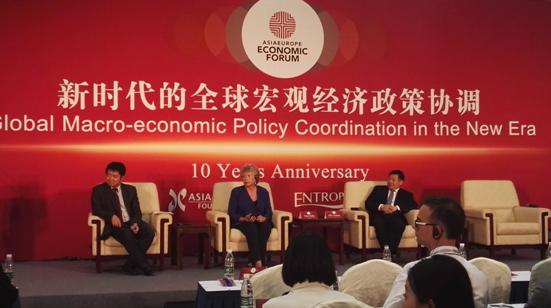Strengthening global policy coordination to fuel economic growth
By Wu Zheyu (chinadaily.com.cn) Updated: 2016-09-24 11:08
 |
|
Zhu Guangyao, China's vice Finance Minister, Viviane Reding, the former Vice-president of the European Commission and Wang Wen, executive dean of Chongyang Institute for Financial Studies, Renmin University of China (RDCY), are responding to the media's questions during the forum. [Photo by Wu Zheyu/chinadaily.com.cn] |
Then he introduced two major milestones that were achieved during the G20 summit this year. First, the policy consensus of G20 has been unveiled for the first time in history: to pursue strong, sustainable, balanced and inclusive growth. Second, President Xi hopes to put forward China's blueprint for innovative growth along with an action plan to break new ground in global economic growth. It's the first time that China has ever delivered such a comprehensive version to the world. This unprecedented plan will help dig out economic growth potential and put the global economy back on a strong, sustainable growth track.
Zhu stressed that: "The world is looking forward to the success of G20 summit, while the G20 countries are also expecting that all the economies could achieve their goals—especially for those less-developed ones, they need to catch up."
A report named "Global Macro-economic Policy Coordination in the New Era" was also issued during the forum. The research group behind this report was lead by RDCY's chief economist He Fan, who conducted the report with coordinated efforts with the National Development and Reform Commission (NDRC) and Chinese Academy of Social Sciences (CASS). It offers five policy suggestions: countries need to save enough space for domestic policies, encourage global public goods cooperation, allow benign competition on global economic reform, let professional international institutes play bigger role and strengthen cooperation between leading powers.
During the guest speakers' discussion, Zhou Qiangwu, director general of International Economics and Finance Institute, Ministry of Finance, highlighted a very special achievement of the G20 summit. This year China came up with the quantitative economic indicator system for structural reform, which is a huge step forward compared to a purely qualitative analysis of structural reform in previous G20 summits, which has overcome difficulties both technically and balancing conflicts of countries under different development stages.
Andreas Esche, director of Program Shaping Sustainable Economies, Bertelsmann Foundation, expressed his views toward China's role in the G20 summit this year during interview with China Daily website: "I did really see China's shouldering a vital responsibility in accord with its growing importance in global community."
- China marks new path for global economy, politics at G20 summit: Mexican expert
- Chinese presidency boosts G20 as possible new model of global governance: Italian experts
- G20 state banquet chinaware available for pre-order
- Digital billboards light up landscape during G20 Summit
- G20 consensus will boost world economy
- G20 to cooperate in fighting graft
- Hangzhou confirms G20's global role

Colombian coffee has a story that I admire and use in my lectures and the reasons are the ones listed above. Congratulations!











